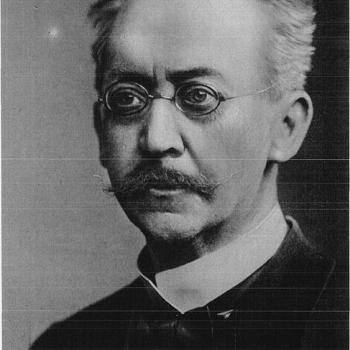
A change of vision by Erik Pevernagie, oil on canvas (3-24-11) [Wikimedia Commons / Creative Commons Attribution-Share Alike 3.0 Unported license]
*****
I admire that. I critiqued his story, and he has stepped up to the plate and defended himself, and has done a pretty good job. His words will be in blue.
*****
You call your story that I critiqued “a tightly distilled version of my (overlong) deconversion . . .” Duly noted. I didn’t know that you had a longer one in print. If I had known that I would have certainly critiqued it instead.
As an overview, one of the dangers of telling a story in less time than it took to live it is that the reader will take your account for a sum total of your experience, rather than a representative snapshot or reductive example. Dave makes this mistake right up front and furthermore takes my desire to be brief to also be extremely shallow. It’s hard not to be insulted by what almost seems patronization on his part, but I’ll give him the benefit of the doubt for now.
Fair enough. I did note that, “Granted, accounts like this (or Christian conversion stories) can’t argue every jot and tittle.” It did seem, at the very least, that you didn’t know much about Catholicism, at least judging by your words of how you left it:
It was that Chick Tract all over again. With that picture, and Duane’s promise that all of the confusing stuff I’d heard about salvation and redemption in my Catholic upbringing was wrong, that it all came down to Believe and Be Saved… Well that was enough for me. I did, and as far as I knew, I was.
And I described this as:
But we don’t know how much he actually knew about Catholicism . . . seemingly not all that much, if he could forsake it merely because of a Bible trivia game and the usual ignorant “Chick Tract”-like anti-Catholic sermonizing. Hence, he appears to have been like many millions of insufficiently catechized Catholics . . . [italics added presently]
If that’s unfair, you are free to let me know how much you really knew about Catholicism: that you ditched based on one encounter with a zealous Protestant. More on this below . . .
I dealt with “No True Scotsman” in my reply to Jonathan about your story. I’m not gonna go through that again. It had nothing to do with my argument. In bringing that up, you and a few others manage to deflect from my actual point: the seeming limitations of your knowledge regarding Catholicism when you left it. All I’ve claimed is that from what it appears, given your story that I read, you didn’t know very much. Feel free to show me that I’m wrong about that.
There are a couple of key things to unpack here. The first is the grossly fallacious assertion that the brand of Christianity I belonged to was some extreme fringe sector of Christianity. I’m not sure if Dave is ignorant of the size, scope, and culture of Evangelical Christianity, but I can assure him and the reader that there is nothing fringe about our experience.
In retrospect, I used language that was too strong (“extreme sect” and “extremist fringe sector”). A better choice of words would have been “small portion of / minority sector of evangelicalism, which is in turn, a minority of all Christians.” I never used the word “cult” at all (you said, “Dave would have his reader believe that we were in some fringe cult”). But I did use unfortunate language, and for that, I apologize. I may have had partially in mind the truly extreme upbringing of another person, whose story I was critiquing at about the same time, and momentarily confused the two, which is not fair to you.
I was an evangelical for thirteen years, and in that world I was an apologist, cult researcher (Jehovah’s Witnesses), campus missionary, and pro-life activist. I have very great respect for evangelicalism and look back with great fondness to that time in my life, which I have publicly written about several times. Many of the things I learned during that time, I hold very dear today, and they are part of the core of my being and beliefs. We ran into the pastor who married us at a wedding and he told me how moved he was by compliments that I paid to him and to evangelicalism in one of these online posts.
I would also note that in your longer story (Part V), you yourself called it “Fundamentalist Evangelicalism with shades of cult-like manipulation.” Thus, you used the word “cult-like” whereas I did not (as an old cult researcher I am extremely careful in applying it). Since you seem to know quite a bit about evangelicalism, you would surely know that fundamentalism is only a portion of it — or some might even say, as I’m inclined to, distinct altogether — (e.g., the fundamentalists absolutely despise Billy Graham and would say that Fuller Seminary is irredeemably liberal). This was your description: not glorious mainstream evangelicalism (that I love very much), but rather, “Fundamentalist Evangelicalism with shades of cult-like manipulation.” Yet you object to me calling it an “extreme sect” and “extremist fringe sector”. I retract that, but I don’t see how it is all that different from your own description. It’s just a matter of (not too great of a) degree. And what you were referring to is pretty much what I had in mind, too.
You also state (same section V), “this church was very much of the Dispensationalist persuasion.” That’s a minority view of larger evanglicalism and certainly a very small minority of all Protestantism. I was a dispensationalist myself for a while (having been fascinated with biblical prophecy, where the dispensationalists dominate the literature), but I changed (including giving up the late unbiblical doctrine of the “rapture”) while still an evangelical. In Part VI you refer to your “fundamentalist evangelical church” and “fundamentalist Evangelicals like ourselves.”
I never prayed “for hours” because I had a silly notion that someone was demon-possessed. That certainly sounds “extreme” to me or “fringe.” I understand that you renounce and regret that. We all live and learn as a general proposition. I’m simply pointing out that there are reasons why one could say your experience was not completely “mainstream” evangelicalism. Young-earth creationism is not that, either. That’s a fundamentalist belief: not held by the vast majority of evangelicals, who would be mostly old-earth creationists or theistic evolutionists.
My point about you seeming not to know much about what you were rejecting when you left Catholicism remains unrefuted. As that is also part of Christianity, it is valid to note that if indeed you didn’t know much about it, it is not compelling for those who are Catholics, to read about someone leaving it for no good reason.
I don’t have to speculate about your relative ignorance as a Catholic. You document it beyond any doubt yourself in your longer story:
We were typical nominal Catholics, though.
[a noting of non-regular family attendance at Sunday Mass, which is a mortal sin: saying your family hadn’t gone for three years]
Church never was central to our lives, but dysfunction was.
I didn’t go to church . . . [at 14]
For the next two-plus years we were pretty typical American teenagers, irreligious, . . .
[then a fuller account of your almost instant conversion to a form of Protestantism]
Nothing here whatsoever tells me that you had much knowledge of your Catholicism (and that’s your “long” story), so that point of mine very much stands.
He makes the common mistake of thinking that people like me left Christianity because such things happened to us. That is not the case. It is things like this that left scars and doubts, and these doubts at some point led us later to examine whether Christianity was a valid belief system that accurately reflected reality.
Fair enough. But it sure seems like it would at least be one factor, by the emphasis that you put on it in your story. It wasn’t unreasonable for me to have that impression. That said, I accept your clarifications.
This is hand-waving, and takes the very human and convoluted nature of the scriptures as evidence that it is perfect, rather than the much more reasonable conclusion that it is simply a human document. This is a common sleight-of-hand for apologists. A perfect, omniscient, omnibenevolent, omnipotent god would have no problem making itself perfectly clear to all people if revelation leading to salvation was actually the goal.
I dealt with this much more in-depth in a Facebook post drawn from my response to Jonathan: “Cardinal Newman and Reformed Theologian Berkouwer on the Essential Silliness of Thinking that Bible Interpretation Would be Easy for One and All (No “Difficulties”), Merely Because the Bible is an Inspired, Divine Revelation.”
The biblical god claims not to be a “God of confusion,” (1 Cor. 14:33) yet his scripture is the literal source of centuries of disagreement leading to over 3,000 denominations.
Denominations come from the nature of Protestantism, as I have written about countless times. It’s not inherent to the supposedly utterly confusing nature of Scripture. If Scripture were the problem, the thousands of denominations would have started up right away: in the first century. As it is, they didn’t until the 16th century, because the Catholic / biblical understanding of authority and unity was ditched. So to blame that on the Bible or overall Christianity is a huge stretch. It is the effect of some of the most serious and unbiblical errors of Protestantism.
Now Dave is going to go on about the primacy of the Catholic faith, etc., but that doesn’t address any of the actual textual issues that led to the continual fracturing of Christianity.
Yes I will. And it is a long, deep discussion. Believe me, I’ve dealt with it inside and out in discussions with my Protestant friends.
Comparing the supposed perfectly inspired Word of God with the gradual discovery and development of scientific theory is specious at best.
My point was that all complex belief-systems / books will have either real or apparent “anomalies” or “difficulties.” The Bible is no different. I used science as the analogy because I know that most atheists virtually think it is the sum of all knowledge (“scientism”) and almost make it their new religion. And your response is entirely predictable.
You don’t like my assertion that many alleged biblical “contradictions” are in fact not so. I’ve demonstrated this myself, and will again, if Jonathan sends me his arguments from his book about the infancy narratives of Jesus. He challenged me to look at it so I said I’d be happy to.
This is Dave not respecting the severely abbreviated nature of my account.
Well, no. All I was saying was that you seemed to treat Gleason Archer’s book rather cavalierly, and that you gave the reader no concrete reason to reject it.
It looks like Dave didn’t even read Archer’s book at all. He seems to have assumed the nature of it.
It’s been in my library for probably over thirty years. It’s twenty feet away from me as I write.
Thanks for the interaction, Anthony, and for taking your time to clarify things, and for not descending into mere rank insults. I appreciate it.
*****













